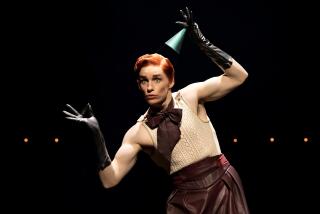THEATER REVIEW ‘ARMS AND THE MAN’ : Shavian Spirit : Santa Barbara Ensemble Theatre’s revival is guided by the author’s irreverence. But it misses gut reality.
“Oh, war! war! the dream of patriots and heroes! A fraud . . . a hollow sham, like love.”
With that exclamation, Sergius, the befuddled Bulgarian soldier in “Arms and the Man,” sums up the twin fronts of George Bernard Shaw’s assault on the smug conventions of 1894 European society.
Outrageous in his time, Shaw took great delight in standing familiar, self-evident truths on their heads, and his spirit of irreverence supplies the guiding light for the Santa Barbara Ensemble Theatre Company’s revival.
Shaw’s barbed arrows at the distortions of romantic love and the delusions of military glory still hit their marks quite humorously--and also a little sadly, as we inevitably reflect on how little has changed between men and women, and between nations (especially in light of the renewed violence in the Slavic regions).
In the play, an ill-fated Serbian invasion of Bulgaria has brought renown to Sergius, the swaggering egoist (Otto Layman) whose suicidal cavalry charge succeeded only because the enemy had stocked the wrong kind of ammunition. But the bad form of his victory has earned him only contempt from the “professional” military, though it feeds the romantic illusions of his fiancee.
Unfortunately, though proclaiming eternal devotion to her betrothed, Raina (Christina Karris) finds herself drawn to a Swiss mercenary (Ron Hastings) from the routed Serbian army, who forces his way into her home and collapses in exhaustion.
A pragmatist whose first goal is his own survival, this soldier would rather carry chocolates than bullets--a far cry from her ideal of gallantry. Yet he deflates her reprimand by telling her, “When you get into that noble attitude and speak in that thrilling voice, I admire you, but I find it impossible to believe a single word you say.”
When she protests that he’s the first man who’s never taken her seriously, he points out that she really means he’s the first man who’s ever taken her seriously.
Hastings is exceptional at bringing some credible natural feeling to this artificially clever banter--his Swiss soldier is a consistently sympathetic embodiment of Shaw’s ideal of unsentimental humanity. Karris, who stepped into the role of Raina a week and a half before the opening, showed impressive command under the circumstances, but still has a way to go in fine-tuning the girl’s transition from illusion to self-awareness.
Layman’s Sergius needs more than fine-tuning, unfortunately--his one-note pomposity has no trace of the Byronic depths Shaw envisioned for the character. It would be hard to believe that his conflict over his attraction to Raina’s maid (Delta Rae Giordano) is rooted in anything other than more self-gratification. But Giordano provides plenty of spunk to make the girl worth caring for.
It’s typical for Shaw to put wry insight into his lower-class characters, and here the servant Louka (Christopher Vore, hysterically swathed in prosthetics and lumbering about with a grotesquely distended belly) supplies the most clearheaded commentary in the play. Rounding out the fun are Charles De L’Arbre and Amelia Laurenson as the girl’s parents, Bulgarian bourgeoisie aping the manners of European society.
Behind the farce always loom the broader social implications. Shaw once wrote: “The tragedy and comedy of life lie in the consequences of our persistent attempts to found our institutions on the ideals suggested to our imaginations by our half-satisfied passions, instead of on a genuinely scientific natural history.”
Ironically, his pursuit of that realism was undermined most by his overly heady dramatic construction. This is the great problem in Shaw, one that director Ben Bottoms and his Ensemble team tackle valiantly but not entirely successfully. Past the artifice of precisely articulated points of view should be the gut reality. We never get there.
The real world is no more complex, or even satisfying, than Shaw’s glittering rational edifice--it’s just a lot messier.
* WHERE AND WHEN
“Arms and the Man” will be performed through March 1, Wednesday through Saturday at 8 p.m., Sundays at 7 p.m. except for 2 p.m. matinees on Feb. 23 and March 1; at the Alhecama Theatre, 914 Santa Barbara St., Santa Barbara. Tickets are $14 Fridays and Saturdays, $12 Thursdays, $10 Wednesdays and Sundays. For reservations or more information, call 962-8606.
More to Read
The biggest entertainment stories
Get our big stories about Hollywood, film, television, music, arts, culture and more right in your inbox as soon as they publish.
You may occasionally receive promotional content from the Los Angeles Times.






